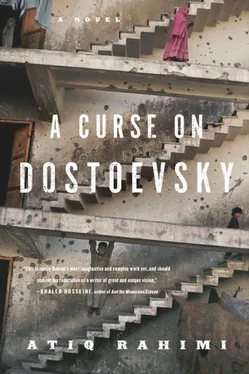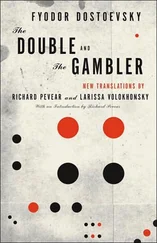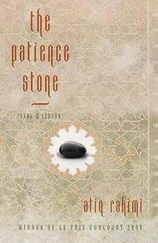“Oh, no! I don’t feel remorse.”
“OK then, not remorse. But you are aware of your crime. Take a look around: Who isn’t killing? And how many criminals have arrived at your level of awareness? Not one.”
“Exactly. It is my awareness that creates my guilt.”
“In that case why do you need a trial or a sentence? Legal proceedings—in an ideal world—are for those who don’t recognize their crime or guilt. And in any case, who could judge you, now? There is no one here, no judge and no public prosecutor. Everyone is at war. Everyone is chasing after power. They have neither the time nor the inclination to come and administer your trial. They are even afraid of trials. The trial of one person can lead to that of others. Do you understand what I’m saying?” Rassoul is confused. The clerk continues: “What do you want? To be imprisoned? Your soul is imprisoned in your body, and your body in this city.”
“So, it makes no difference whether I’m in here or outside.”
“It makes no difference.”
“In that case, I’m staying here.”
The clerk has had enough. He picks up the file and throws it on the floor. “But there’s no one here. I can’t deal with you,” he cries, “there’s no more prison, no more ‘surveillance’ department… nothing. There is nothing here anymore! Not even the law. They are busy altering the penal code. It will all be based on fiqh , on sharia.” He stares furiously at Rassoul for a long time, in oppressive silence. Then, before picking up the file lying at Rassoul’s feet, he holds out his hand: “Delighted to have met you, young man. It’s time for my prayers. Good day!” He puts the file back on the desk, and withdraws into another room.
Rassoul is staggered—wordless, voiceless, more mute than before.
Where am I?
In Nakodja abad , nowhere land!
Farzan returns. “So you’re staying? Good decision. It’s great, here. It’s a safe haven… Mr Clerk Sir lives here with his whole family. It’s nice and cool. His wife is lovely. She’s very pretty, too, and a good cook…”
“The woman who came in just before I did? A woman in a sky-blue chador?”
“Oh, no! She never goes out. She’s afraid of the bombs. She’s afraid of being alone. She’s a bit…”
So she isn’t that wretched woman. In that case, why is the clerk so keen for me to leave?
“Brother!” A deep voice, followed by footsteps finding their way in the dark, interrupts Rassoul’s suspicious thoughts. Farzan dashes into the next-door room, signaling for Rassoul to follow, but he doesn’t. Four armed men appear.
“Isn’t the clerk here?”
“He is praying,” replies Rassoul.
“And you, what are you doing here?” asks one.
“My name is Rassoul, and I have come to hand myself over to the law.”
“What are you doing?” asks the same man. “Are you working here?” continues another. “No, I have come to hand myself over to the law,” repeats Rassoul, dazed by these four men who keep exchanging suspicious glances. One of them says, “We’re not hiring, you know!”
“I haven’t come to work. I’ve come to be tried.” One of the men strokes his beard and stares at Rassoul. “You want to be tried? For what?”
“I’ve killed someone.”
They look at each other again. Uneasy. They don’t know what to say. In the end, one of them walks up to Rassoul and says: “We’ll have to check this out with Qhazi sahib. Come with us!”
As they are leaving the building, the clerk comes up with Farzan in tow. “You were looking for me?”
“Yes, Qhazi sahib wants to know if you have his list of shahids.”
“Not yet!”
“Go back to work, then, and bring it to us as soon as you do!” But the clerk just stands there, aghast at Rassoul’s idiocy.
They enter a partially destroyed building, and then an imposing room furnished with a large desk. The judge is sitting behind it, paying them absolutely no mind and eating a large slice of watermelon. A white cap covers his great shaved head; a long beard lengthens his fleshy face. They wait for him to finish. Finally, he puts the rind down on a tray, takes out a large handkerchief, and wipes his mouth, beard, and hands. With a stomach-settling belch, he motions to an old man to take away the tray. Then he picks up his prayer beads, glances at Rassoul, and asks the others: “What’s the problem?”
“We have brought you a murderer.” The Qhazi’s gaze moves from Rassoul to his men with no expression except for a silent “So?”
“Where did you arrest him?”
“We didn’t arrest him. He turned himself in.” Now the judge is surprised. He looks back at Rassoul. “Who did he kill?” No response. One of the men murmurs in Rassoul’s ear: “Who did you kill?”
“A woman.”
Another family case, and thus of no interest. The judge has a watermelon pip stuck between his teeth, and is trying to dislodge it with the tip of his tongue. No luck. He continues, in a detached voice: “And the motive?” Silence, again. Again, the guard passes the question to Rassoul, who shrugs his shoulders to indicate that he doesn’t know. “Was she his wife?”
“Was she your wife?”
“No,” replies Rassoul at last, weary of these indirect questions and contemptuous stares. The judge pauses, not to think but to focus on the watermelon pip, the blasted pip. A new approach, with the index finger this time. Impossible. He gives up. “Who was it, then?”
“A woman called Nana Alia, from Dehafghanan,” replies Rassoul before the guard can repeat the question.
“To steal from her?” asks the judge.
“No.”
“Rape her?”
“No.”
Again the interrogation pauses while the Qhazi has another go at the pip. He sticks his thumb and index finger into his mouth. There’s no way he’s going to do it. Rassoul would like to help him; his index finger is slim and bony, with a hard, tough nail. He has it down to a fine art: you have to push the pip with the end of your nail and suck it at the same time.
“Where are the witnesses?”
“There are no witnesses.”
More and more enraged by the damned watermelon pip, the judge nervously tears the corner of a piece of paper from one of his files. He folds it and slips it between his teeth. Hopeless. As soon as it’s wet the paper becomes floppy. The judge loses his temper, throws the paper down on the desk and asks, “Doesn’t anyone have a match?” Rassoul immediately hands over his box. The judge takes one, removes the sulphur, sharpens it with his nails, and gets down to picking out the blasted pip. Success at last. Relieved, he stares at this aggravating speck, and then instructs the guards: “Let him go! I don’t have the time to deal with this sort of thing.”
“Come on!” One of the guards grabs Rassoul by the arm. But he remains standing in front of the Qhazi’s desk. He will not move, he won’t! He will rush at the judge, grab him by the beard, and shout: “Look at yourself, in me! I’m a murderer like you! So why don’t you suffer?” He takes a step forward, but the guard’s hold on him prevents further movement. “Qhazi sahib, you must judge me,” he demands suddenly. The judge pensively strokes his own forehead for a moment and then says, spelling out the words to the rhythm of the prayer beads moving between his fingers: “Your case is a matter of qisas . Find the woman’s family, and pay the price of the blood. That’s all. Now, leave my office.”
“That’s all?”
Yes, Rassoul, that’s all. You knew it would be, the clerk told you as much.
“YES, YOU told me as much,” admits Rassoul, sitting in front of the clerk’s desk as he extracts the names of all the shahids executed in the communist prisons from a file. “But I thought I’d be able to persuade him to institute proceedings against me… and then against others, against all the war criminals.” The clerk glances up at Rassoul ironically. “Where do you think you are?”
Читать дальше












